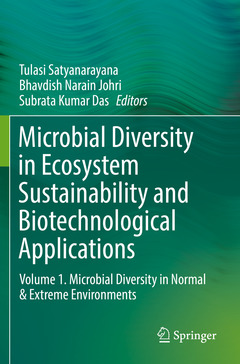Microbial Diversity in Ecosystem Sustainability and Biotechnological Applications, 1st ed. 2019 Volume 1. Microbial Diversity in Normal & Extreme Environments
Coordonnateurs : Satyanarayana Tulasi, Johri Bhavdish Narain, Das Subrata Kumar

This book discusses microbial diversity in various habitats and environments, its role in ecosystem maintenance, and its potential applications (e.g. biofertilizers, biocatalysts, antibiotics, other bioactive compounds, exopolysaccharides etc.). The respective chapters, all contributed by renowned experts, offer cutting-edge information in the fields of microbial ecology and biogeography. The book explains the reasons behind the occurrence of various biogeographies and highlights recent tools (e.g. metagenomics) that can aid in biogeography studies by providing information on nucleic acid sequence data, thereby directly identifying microorganisms in various habitats and environments.
In turn, the book describes how human intervention results in depletion of biodiversity, and how numerous hotspots are now losing their endemic biodiversity, resulting in the loss of many ecologically important microorganisms. In closing, the book underscores the importance of microbial diversity for sustainable ecosystems.
Prof. T. Satyanarayana is currently a UGC-BSR Faculty Fellow at the Division of Biological Sciences & Engineering, Netaji Subhas University of Technology, New Delhi after retiring from the Department of Microbiology, University of Delhi South Campus, New Delhi, as Professor and Head in June 2016. He has over 270 scientific papers and reviews, 8 edited books and 2 patents to his credit. He is a fellow of the National Academy of Agricultural Sciences (NAAS), Association of Microbiologists of India (AMI), Biotech Research Society (I), Mycological Society of India (MSI) and Telengana Academy of Sciences. He is a recipient of the AMI’s Dr. Manjrekar Award, the MSI’s Dr. Agnihotrudu Award, and the BRSI’s Malaviya Memorial Award. With over 40 years of research and teaching experience, he is also a past president of the AMI and MSI. His research efforts have largely focused on understanding the diversity and applications of yeasts; thermophilic fungi and bacteria and their enzymes; metagenomics; carbon sequestration employing extremophilic bacterial carbonic anhydrases; and bioethanol production from lignocellulosic substrates using enzyme cocktails.
Dr. B.N. Johri is a former NASI senior scientist at the Department of Biotechnology, Barkatullah University, Bhopal (India). He has received various academic awards, including the Indian National Science Academy’s Young Scientist Medal, the Rafi Kidwai Memorial Award and the Katzu Award. He is a fellow of the National Academy of Sciences (I), National Academy of Agricultural Sciences and National Institute of Ecology. He has considerable teaching and research experience, and has 150 research publications and 5 edited books to his credit.
Dr. Subrata K. Das has been a Scientist at the Institute of Life Sciences, Bhubaneswar, part of the Department of Biotechnology, Government of India, since 2003. His main research interests are in microbial genomics and translational resea
Date de parution : 08-2020
Ouvrage de 635 p.
15.5x23.5 cm
Date de parution : 07-2019
Ouvrage de 635 p.
15.5x23.5 cm
Disponible chez l'éditeur (délai d'approvisionnement : 15 jours).
Prix indicatif 242,64 €
Ajouter au panier


